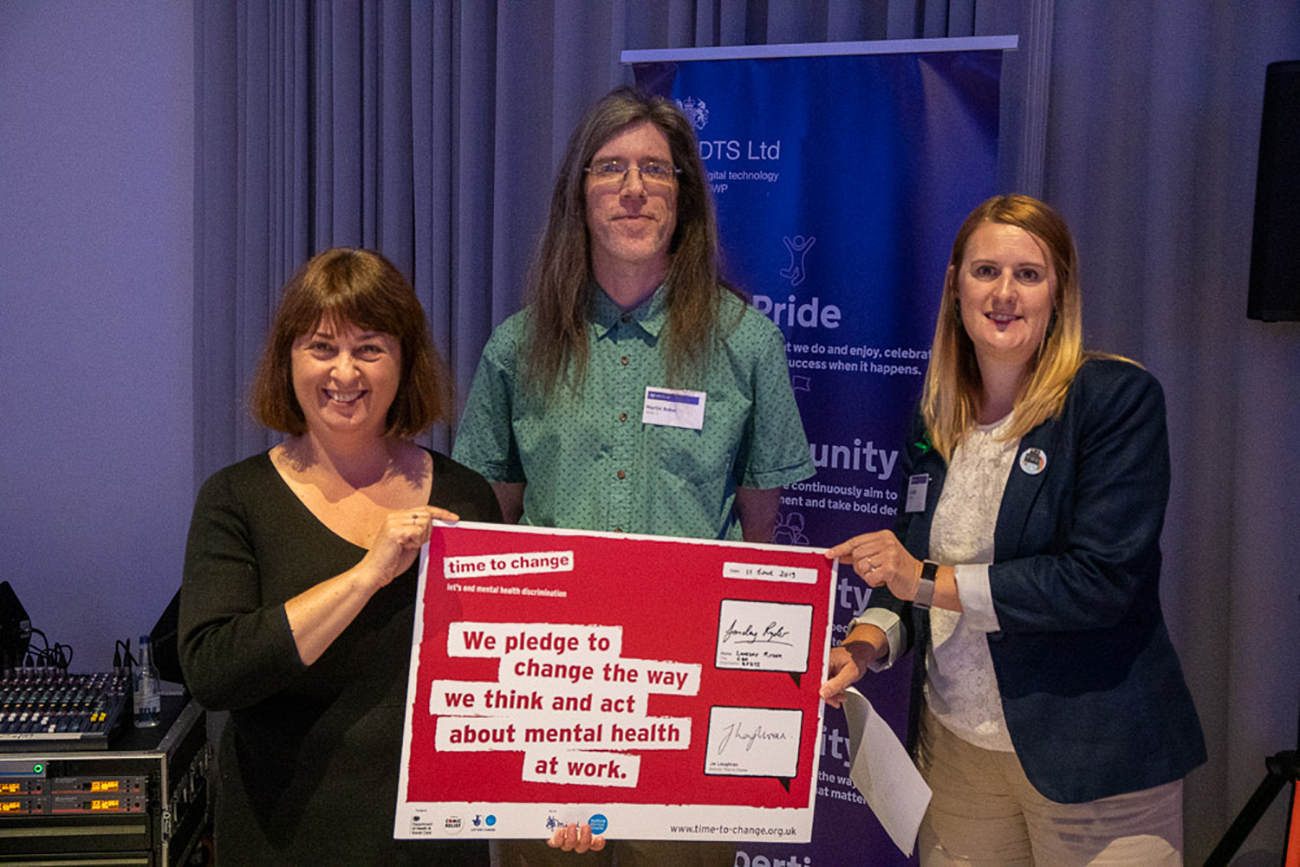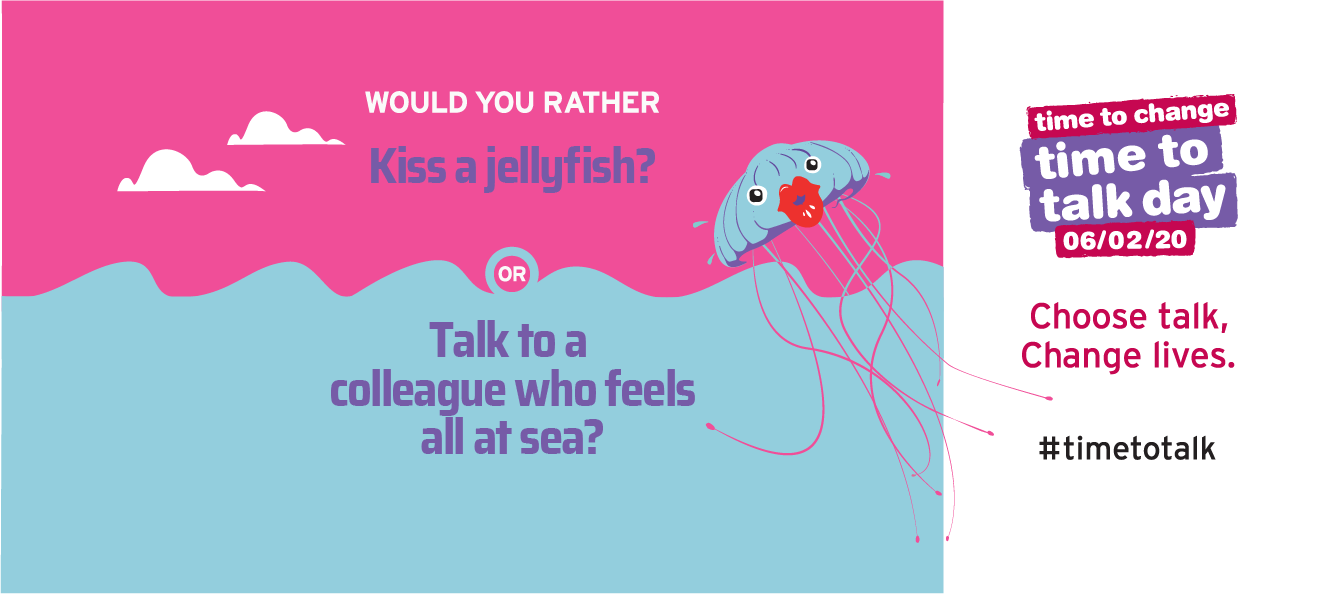Mental health problems are more common than most people realise – affecting one in four of us. In 2018/19, we lost 12.8 million working days to work-related stress, depression, or anxiety – and it continues to be a significant problem in the UK:
- 44% of all work-related illnesses are caused by stress, depression, or anxiety.
- 54% of all working days lost are due to ill health.
- 602,000 work-related cases were associated with stress, depression, or anxiety in 2018/19.

Stress-induced absences on the rise
While stress, depression, and anxiety are more prevalent in public service industries, no one is immune from the pressures of everyday working life. Stress makes people 3 times more likely to leave their jobs, temporarily impairs strategic thinking, and stifles creativity. The latest figures from the Health Safety Executive show the rate of total self-reported work-related stress, depression, or anxiety is increasing.
Put mental health on the agenda
The state of the UK's mental health is a significant challenge for everyone. A joint report issued by Deloitte UK and Mind shows the cost of poor mental health to employers has increased to £45 billion, a 16% increase since 2016. Two major factors contributing to the jump are presenteeism – staying at work when you are not well – and the use of technology leading to always-on behaviour.
Fear of stigma and reprisal
Mental health is a costly challenge to ignore. Employers need to do more to address it in the workplace. Leading organisations across all sectors are putting mental health and wellness issues on the boardroom agenda for ethical, financial, and legal reasons. However, not all industries and organisations are at the same stage in this journey.
In some sectors, it’s still unacceptable (or uncomfortable) to talk about mental health. People are reluctant to speak freely about their situation for fear of stigma and reprisal, leaving them feeling ashamed or isolated. Rather than raise the issue and take time off, unwell workers spend unproductive hours at work. In other cases, employees experience burnout, emotional, and physical collapse.
Lack of sleep, high-stress levels, and poor concentration decrease our ability to think clearly. These symptoms sap the cognitive load we need to problem-solve and collaborate with colleagues and clients. The situation can rapidly escalate with performance reviews affected. The spiral continues with reprimands causing damage to reputations, career mobility, and potential job loss. It doesn’t have to be that way.
Don't dodge the conversation
Employee wellness and mental health are too essential to sweep under the carpet. Get employees to talk to reduce the stigma. The more conversations we have about mental health, the more myths we can bust. Talking about how we feel helps to break down the barriers and reduces isolation, shame, and worthlessness too many of us feel when experiencing a mental health problem.
Time to Talk Day is an annual awareness event organised by Time to Change. This year it takes place on Thursday, 6 February, and uses the popular game ‘Would you rather?’ to encourage more of us to talk than ever before.

If you’re not familiar with the game, it’s played by asking a series of questions of the form, “Would you rather [do this] or [do that]?” The idea is to break the ice and get a mental health conversation flowing. Learn more about how to embed the Time to Talk Day activities in your workplace.
Create a culture of acceptance
When so many of us experience the effects of mental illness – in ourselves or those we care about – it’s in everyone’s interest to be open, non-judgmental, and understanding. Being able to share how we feel in a safe environment makes us feel less alone.
Hearing someone else’s story is a powerful reminder you are not alone. A senior leader who speaks out about their own experience demonstrates understanding and empathy. A personal story shared goes a long way to instilling trust in an organisation.
No matter what the forum – Town Hall meetings, canteen meetups, formal and informal communities of interest, blogs, or newsletters – inviting guests to share their journey through mental illness helps lift the stigma and create a more compassionate workplace culture.
Make wellness a collective responsibility
It’s no longer enough to have an employee assistance programme in place. Employers need to scrutinise their HR and employee assistance policies and look for more proactive ways to support their people. At BPDTS, our HR partners continually evaluate how to enhance our employee assistance programmes. Our HR team spends time with line managers to ensure our policies offer the support our employees need when they need it.
Ask how your people feel
BPDTS holds regular listening sessions to ensure our employees’ concerns are captured. The initial sessions are open invitation and face-to-face meetings. Employees are also invited to provide input and feedback on the topics they care about most through surveys, emails, and one-to-one discussions.
Use a bottom-up approach
Engaging employees in the shaping of new policies and providing ongoing communication puts action behind the intention. At BPDTS, our cultural transformation initiatives are driven from the bottom up. All employees can volunteer as workstream leaders and engage in communities of interest as leaders and members. Together with our leadership team, we are helping to improve the overall employee experience, creating a workplace reflective of our values and priorities.
Introduce Mental Health First Aiders
BPDTS actively embraces an open and inclusive culture where everyone can feel comfortable in their skin. However, it’s not always easy to admit when you are struggling. Our Mental Health First Aiders train to provide support, information, and guidance to our employees. The programme ensures everyone has access to someone to talk to when they need it. We have also created physical spaces in some of our offices where our people can relax, enjoy personal quiet time, or physical activity such as table tennis, to alleviate stress.
Roll-out Smarter Working practices
BPDTS introduced a Smarter Working initiative. Smarter Working encourages flexible working. The policy helps employees maintain a balance between their personal and professional roles. For instance, if you are caring for someone experiencing mental health issues, you may need to take time off or have greater flexibility in scheduling appointments or other commitments.
Taking advantage of remote working and being able to negotiate flexible hours allows our people to manage personal circumstances as and when they surface. Everyone benefits from Smarter Working: employers, employees, and their families.
Develop communities and champions
Mental health impacts all of us. The person living with the condition, as well as family, friends, and colleagues, are also affected. Personal and professional relationships may suffer. Making connections with people in similar situations can help employees who have family members or friends living with mental illness.
Encouraging communities of interest to meet and discuss sensitive topics such as depression, anxiety, personality disorders, addiction, and suicidality can bring taboo subjects into the mainstream. But, finding the right groups and information can be tricky. We are establishing champions in each of our hub locations to steer individuals to places where they can seek professional assistance.
Support employee wellbeing
Change offers the opportunity for improvement and growth, but we all respond in different ways to the challenges presented. To coincide with Time to Talk Day, The Charity for Civil Servants is launching a ‘Wellbeing Guide’ app to support staff wellbeing through times of change. The app contains best practice and ideas from civil servants themselves alongside a range of useful links and resources to help managers support the wellbeing of their team through periods of change and transition.
Employers can’t take care of their people 24 hours a day. What they can do is promote awareness and signpost to internal and external support. Knowing how to recognise the common signs of poor mental health, providing a supportive environment, and programmes such as Smarter Work, Mental Health First Aiders, and evolving employee assistance policies, can make a massive difference to an organisation’s most valuable asset – its people.

Learn more
Time to Change is the UK’s most extensive mental health campaign challenging stigma and discrimination. BPDTS is proud to have joined over 1,400 organisations in signing Time to Change’s Employer Pledge.
BPDTS has also signed up for the Tech Talent Charter. The Tech Talent Charter demonstrates our commitment to diversity and inclusion in the workplace.
Download the Charity for Civil Servants’ ‘Wellbeing Guide’ App. You can download the app using these links on Google Play or the Apple App Store, by searching for ‘Wellbeing Guide.’
Leave a comment